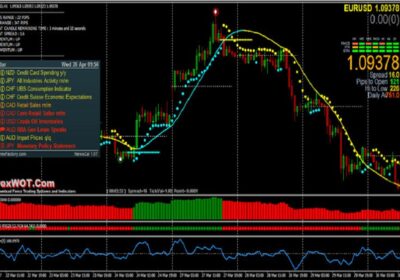
Using the Black-Scholes Model to Predict Market Movements in CFD Trading
Contracts for Difference (CFDs) offer a versatile trading instrument that allows investors to speculate on price movements of various assets without owning the underlying asset. This flexibility makes CFDs a popular choice among traders looking to capitalise on market fluctuations. However, predicting these movements accurately remains a significant challenge. In this quest for precision, the Black-Scholes Model, originally designed for options pricing, can provide valuable insights. This article explores how this renowned financial model can be adapted for CFD trading, offering a detailed examination of its principles, modifications, practical applications, and enhancements.
Understanding the Black-Scholes Model
The Black-Scholes Model, introduced by Fischer Black, Myron Scholes, and Robert Merton in 1973, revolutionised financial theory by providing a mathematical framework for pricing options. For a thorough understanding, it’s useful to delve into the Black Scholes model definition. This model is grounded in several key assumptions: markets are efficient, stock prices follow a lognormal distribution, there are no transaction costs, and the risk-free rate remains constant.
At its core, the Black-Scholes formula calculates the theoretical price of European-style options based on five variables: the current stock price, the option’s strike price, the time to expiration, the volatility of the stock, and the risk-free interest rate. The model’s elegance lies in its ability to generate a precise option price, which traders can use to make informed decisions. However, it is not without limitations. Real-world deviations from the model’s assumptions, such as market frictions and changing volatility, can impact its accuracy and reliability.
Adapting the Black-Scholes Model for CFD Trading
CFD trading differs from options trading in several fundamental ways, which necessitates modifications to the Black-Scholes Model for effective application. Unlike options, CFDs do not have an expiration date and can be traded with leverage, which amplifies both potential gains and losses. These differences mean that the direct application of the Black-Scholes formula is not feasible.
To adapt the model for CFD trading, traders need to account for leverage and margin requirements. Leverage magnifies the exposure to price movements, altering the risk profile compared to traditional options. Additionally, factors such as dividend yields and transaction costs must be incorporated into the model to enhance its relevance for CFDs. For instance, while dividends might affect the pricing of options, they can also influence CFD valuations, making it crucial to adjust the model accordingly.
Practical Application: Predicting Market Movements
Applying the Black-Scholes Model to CFD trading involves several key steps. The first step is to gather and prepare relevant data, including historical price movements and volatility estimates. This data forms the basis for inputting into the Black-Scholes formula, which then calculates the theoretical price or value associated with the CFD.
Once the model generates its output, interpreting these results is essential for making informed trading decisions. The calculated values can provide insights into the expected price movements and potential profitability of CFD trades. For example, a predicted increase in the value of a CFD based on the model could indicate a favourable trading opportunity. Conversely, discrepancies between model predictions and actual market movements may signal the need for a reevaluation of the trading strategy.
Enhancing the Black-Scholes Model
To improve the accuracy and applicability of the Black-Scholes Model for CFD trading, traders often integrate additional models and techniques. Combining the Black-Scholes Model with technical analysis tools, such as moving averages and Relative Strength Index (RSI), can offer a more comprehensive view of market conditions. These tools help traders analyse historical price patterns and identify potential entry and exit points.
Moreover, advancements in machine learning and artificial intelligence provide new opportunities for refining market predictions. By leveraging algorithms that analyse vast amounts of data, traders can enhance the Black-Scholes Model’s predictive power. Various software platforms and tools are available that incorporate these advanced techniques, offering traders sophisticated solutions for analysing CFD markets.
Benefits of the Black-Scholes Model
The Black-Scholes Model offers several significant benefits that have made it a cornerstone in financial markets. Its primary advantage lies in its ability to provide a systematic and precise framework for pricing options, which aids traders and investors in assessing the fair value of options contracts. By incorporating key variables such as stock price, strike price, volatility, time to expiration, and the risk-free rate, the model delivers a reliable valuation that helps in making informed trading decisions.
Additionally, the Black-Scholes Model’s mathematical rigour and analytical clarity simplify complex pricing scenarios, making it easier for traders to evaluate various strategies and manage risk. Its widespread use and theoretical foundation also enable comparability and standardisation in options pricing, fostering greater transparency and efficiency in financial markets.
Conclusion
The Black-Scholes Model, originally designed for options pricing, offers valuable insights when adapted for CFD trading. Understanding its theoretical foundation and limitations is crucial for effectively applying it to CFD markets. By modifying the model to account for differences such as leverage and transaction costs, traders can enhance its relevance and accuracy. Furthermore, integrating additional analytical tools and leveraging technological advancements can further refine market predictions and trading strategies.
















